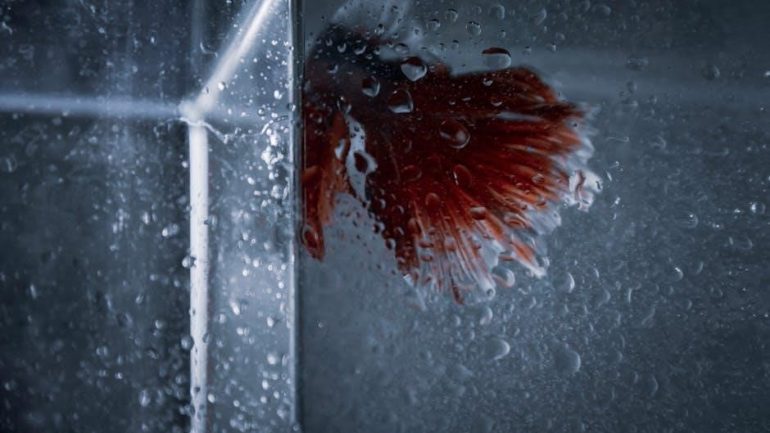What is a Betta Fish?
Betta Fish, known as Siamese fighting fish, are vibrant aquatic pets․ Originating from Thailand, they’re popular for their unique appearance and low-maintenance care, making them perfect for aquarium enthusiasts․
What is a Betta Fish?
Betta Fish, scientifically known as Betta splendens, are vibrant, small freshwater fish native to Thailand․ Known as Siamese fighting fish, they are renowned for their striking appearance, elaborate fins, and diverse colors․ Bettas are labyrinthine breathers, using their labyrinth organ to gulp air from the surface, allowing them to thrive in low-oxygen environments․ Their popularity stems from their unique beauty, relatively small space requirements, and intriguing behavior․ Originating from swampy waters, Bettas have become beloved pets worldwide, especially for aquarium enthusiasts seeking a visually stunning and engaging species to care for․
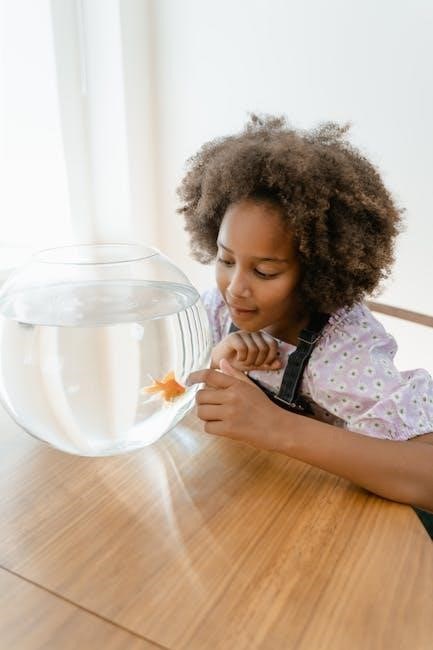
History and Origin
Betta Fish, scientifically known as Betta splendens, are an ancient species native to Thailand․ Originating from freshwater habitats like swamps and marshes, they have been domesticated for over 600 years․ Initially bred for fish fighting in Siam (now Thailand), Bettas were valued for their aggressive nature and vibrant appearance․ By the 19th century, they were introduced to the West as ornamental fish, gaining global popularity․ Their rich history and unique traits have made them a beloved aquatic pet, cherished for their beauty and intriguing behavior, while also highlighting their resilience and adaptability to various environments․
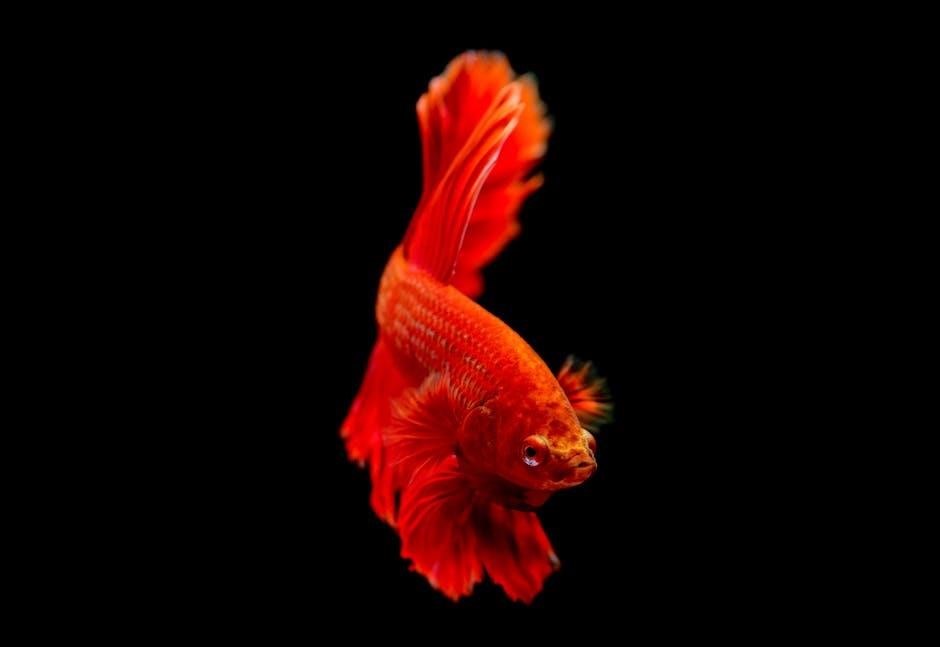
Tank Setup for Betta Fish
Setting up a Betta Fish tank requires a heater, filter, and live plants․ A minimum 5-gallon tank is recommended, with warm water and stable pH levels․
Optimal Tank Size and Type
Betta fish thrive in tanks with a minimum capacity of 5 gallons, though a 10-gallon tank is ideal for stable water conditions․ Larger tanks provide ample space for swimming and reduce water parameter fluctuations․
A standard aquarium is recommended over tall or narrow tanks, as they offer better swimming room․ Adding live plants enhances the environment, while avoiding bow-front tanks is advised․ A secure lid is essential to prevent jumping․
Water Parameters and Quality
Betta fish require warm water, with temperatures between 76°F and 81°F․ The ideal pH range is 6․8–7․5, and they prefer hard water (15–30 dGH)․ Regular water testing is essential to monitor ammonia, nitrite, and nitrate levels․ Performing weekly water changes (25% of the tank volume) helps maintain water quality and prevents toxin buildup․ Always use a reliable water test kit to ensure parameters remain stable․ Sudden changes can stress your Betta, so gradual adjustments during water changes are crucial․ Proper water management is key to keeping your Betta healthy and thriving in its environment․
Essential Equipment (Filter, Heater, etc․)
A reliable filter is crucial to maintain clean water and oxygen levels for your Betta fish․ A heater is necessary to keep the water temperature between 76°F and 81°F, as Bettas are tropical․ Live plants not only enhance aesthetics but also improve water quality by absorbing excess nutrients․ A secure lid prevents jumping, and a high-quality light can promote plant growth․ Regularly check and maintain all equipment to ensure optimal performance․ Proper equipment setup creates a stable environment, essential for your Betta’s health and longevity in captivity․
Feeding Your Betta Fish
Feed your Betta fish once daily, only as much as they can consume in one minute․ Avoid overfeeding to prevent digestive issues․ Offer high-quality flakes or live/frozen foods like brine shrimp or bloodworms for a balanced diet․
Feeding Frequency and Portion Control
Betta fish should be fed once daily, providing only what they can consume within one minute․ Overfeeding can lead to digestive issues and water quality problems․ Stick to small portions, such as 2-3 high-quality pellets or a few live/frozen foods like brine shrimp or bloodworms․ Avoid feeding them excessively, as their stomachs are small․ Skipping a meal occasionally can help prevent bloating and promote a healthy digestive system․ Always remove uneaten food after a few minutes to maintain clean water conditions and ensure your Betta stays healthy and thriving․
Best Foods for Betta Fish
Betta fish thrive on a varied diet rich in protein․ High-quality commercial Betta pellets or sticks should form the staple, supplemented with live or frozen foods like brine shrimp, bloodworms, or daphnia․ These provide essential nutrients for vibrant color and energy․ Live plants can also be included to aid digestion․ Avoid overfeeding by offering small portions, ensuring they consume all food within minutes․ Treats like freeze-dried options should be given sparingly to prevent digestive issues; A balanced diet supports their health and longevity, keeping them active and colorful․ Always choose foods specifically formulated for Betta fish to meet their unique nutritional needs․
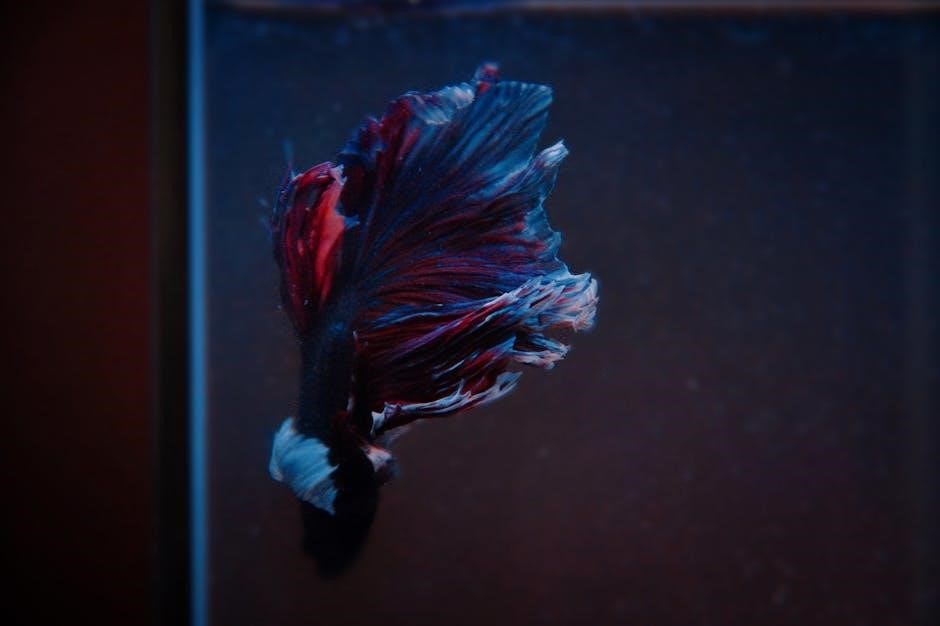
Water Maintenance and Care
Regular water changes (25% weekly) are crucial for Betta fish․ Test water quality consistently to ensure pH and hardness levels remain stable․ Maintain warm water temperatures between 76-81°F for optimal health․
Regular Water Changes
Regular water changes are vital for maintaining a healthy environment for your Betta fish․ Replace 25% of the tank water weekly to remove pollutants and replenish essential elements․ Use a gravel vacuum to siphon debris from the substrate, ensuring cleanliness․ Avoid sudden water parameter shifts, as this can stress your fish․ Consistent water changes help prevent illness and keep your Betta thriving․ Always use treated water that matches the tank’s temperature and chemistry to ensure a safe and stable environment for your fish․
Testing Water Quality
Testing water quality is essential for maintaining a healthy environment for your Betta fish․ Regularly check pH, ammonia, nitrite, and nitrate levels to ensure they remain within safe ranges․ Betta fish thrive in water with a pH of 6․8–7․5 and are sensitive to sudden changes․ High levels of ammonia or nitrites can be toxic, while nitrates should be kept low through regular water changes․ Use a reliable test kit weekly to monitor these parameters and adjust as needed․ Proper water testing helps prevent stress, disease, and ensures your Betta remains healthy and active in its aquarium․
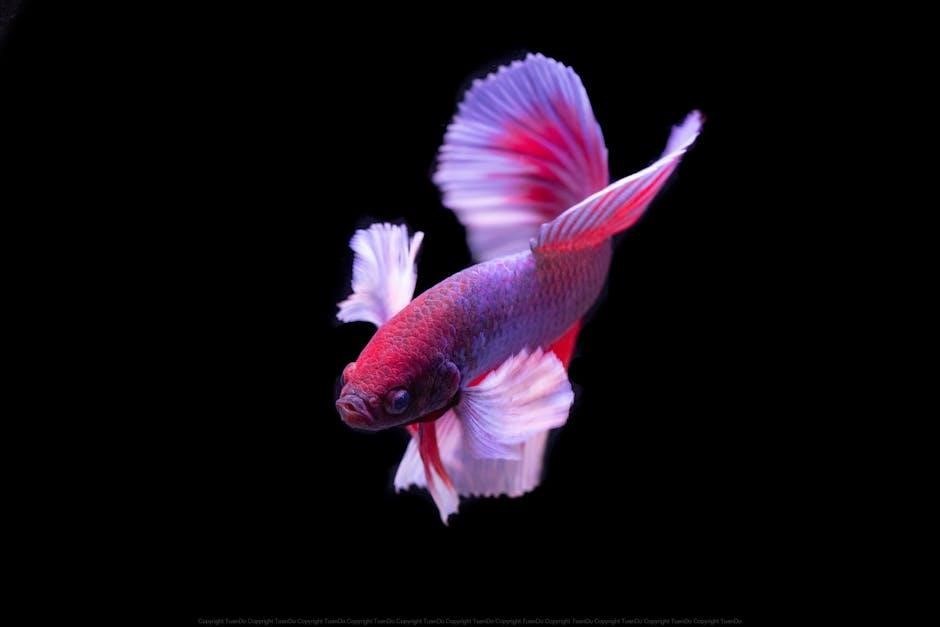
Health and Common Issues
Betta fish are generally hardy but can face issues like fin rot or fungal infections due to poor water quality or stress․ Regular monitoring is crucial․
Recognizing Signs of Illness
Identifying health issues early is critical for treating Betta fish effectively․ Common signs include labored breathing, lethargy, loss of appetite, or rapid gill movement․ Physical changes like dull color, frayed fins, or visible sores may indicate illness․ Betta fish are prone to fin rot, fungal infections, or parasites if water quality deteriorates or stress occurs․ Monitoring daily behavior and appearance helps detect these issues promptly, allowing for timely intervention․ Regular water tests and a clean environment are essential for preventing such problems and ensuring your Betta remains healthy and vibrant․ Always watch for unusual behaviors, as they often signal underlying health concerns that need immediate attention․
Preventing and Treating Common Diseases
Preventing diseases in Betta fish starts with maintaining excellent water quality through regular changes and using a reliable heater to keep temperatures stable․ Common issues include fin rot, fungal infections, and parasites, often caused by poor water conditions or stress․ Treating diseases early is crucial, with medications like API Super Ick Cure or specialized fungal treatments being effective․ Quarantining new fish and adding a quarantine period before introducing them to the main tank can prevent the spread of illness․ Daily monitoring of behavior and appearance ensures quick action if signs of sickness arise, helping your Betta recover and thrive․
Betta Fish Compatibility
Betta fish are typically solitary and aggressive, especially males, which may fight with other Bettas or fin-nipping fish․ They can coexist with peaceful, non-competitive species like snails or small, calm fish in well-planted tanks but require careful monitoring to prevent aggression․
Can Betta Fish Live with Other Fish?
Betta fish are naturally territorial and aggressive, especially males, which may fight with other Betta fish or fin-nipping species․ While some calm, non-competitive fish like snails or small, peaceful species can coexist in well-planted tanks, compatibility is challenging․ Aggression may arise, and monitoring is essential․ Ensuring ample space and hiding places can reduce conflicts, but many aquarists recommend keeping Bettas alone to prevent stress and ensure their well-being․ Introducing tankmates requires careful consideration of their temperament and environment to maintain harmony․
Why Solitary Housing is Often Recommended
Betta fish are naturally territorial and aggressive, particularly males, which often leads to conflicts with other fish․ Housing them alone prevents fighting, reduces stress, and minimizes the risk of fin nipping or injuries․ Solitary housing also allows for a more stable environment tailored to their specific needs, such as water temperature and quality․ Many aquarists find that keeping Bettas alone ensures their health and longevity, as they thrive without competition or aggression․ This approach simplifies care and creates a peaceful, thriving space for your Betta to live its best life․
Betta fish are stunning and fascinating pets that thrive with proper care․ Originating from tropical climates, they require specific conditions to flourish․ By providing an appropriate tank size, maintaining optimal water quality, and ensuring a balanced diet, you can create a nurturing environment for your Betta․ Regular water changes, monitoring health, and understanding their solitary nature are key to their longevity․ With dedication and the right approach, your Betta will lead a happy and healthy life, becoming a vibrant and cherished companion in your home aquarium․
